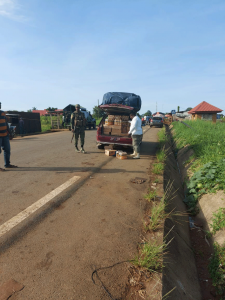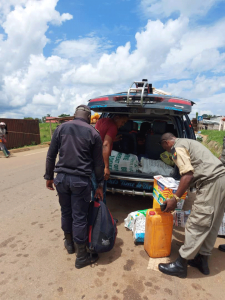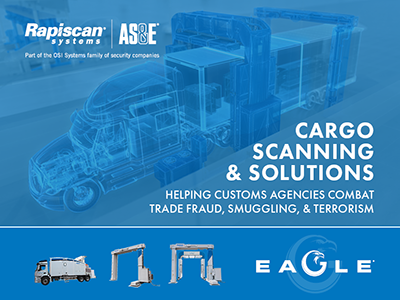Working against a security crisis backdrop: the experience of units in South-West Cameroon
14 June 2023
By Serge Martin Tepiele, Head of the Kumba trade subdivision at Cameroon CustomsThe security crisis gripping a number of regions in Cameroon has severely disrupted the day‑to-day operations of the local Customs surveillance units. Whether seeking to nurture a survival instinct, protect the physical integrity of staff or forge ahead with surveillance missions, these units struggle to find the appropriate balance. However, these surveillance units have learned over time to develop tricks and tactics, and make the operational adjustments needed to complete the various missions allocated to them by the public authorities. This article looks at the experience of the surveillance units based in Cameroon’s South-West Region.
The WCO refers to fragile borders primarily in three types of situation: where a country faces a security risk due to its proximity to countries that are in a security crisis or post-conflict situation; where a country faces the continued or sporadic presence of armed groups, State or non-State, in one or more of its border areas, and where a country is in a post-conflict situation, and a national crisis has occurred which has led to the weakening of the State and therefore of Customs throughout the country. In all of those situations, the fragile border refers to border areas where conflicts and violent incidents generate a context of insecurity affecting the border economy. More generally, the authority of the State is contested in these areas. States and armed groups compete over fiscal, economic and political power to organize the movement of people and goods.[1]
For almost an entire decade, a number of fragile situations have been observed in Cameroon. Since 2014, the armed terrorist group “Jama’atu Ahlul Sunna Lidda’awati Wal Jihad” (Group of the People of Sunnah for Dawa and Jihad), also known as Boko Haram, has held sway in the country’s North Region. Along the eastern border, there is a degree of insecurity due to the proximity to the Central African Republic, which has been affected by internal instability. Furthermore, in the English-speaking South-West and North-West Regions of the country, separatist groups have continued to rise up against Cameroon’s defence and security forces since 2016.
In view of the scale of the crisis and the significant number of civilian and military victims recorded to date, it is clearly difficult for an officer of the State deployed in these areas to work without threat or fear of harm. The danger is particularly acute for officials working in Customs – a paramilitary corps in Cameroon – and especially for those officers serving in the “active” section of Customs and who are primarily responsible for surveillance, whose operations cover enforcement as well as tackling smuggling and other illicit trafficking. Such duties require a permanent presence and the completion of appropriate checks within the Customs remit, with a special surveillance zone set up along the length of the land and maritime borders, extending up to 12 nautical miles outside territorial waters and up to 60 kilometres, as the crow flies, beyond the land borders (Articles 80 and 81 of the Customs Code of the Economic and Monetary Community of Central Africa).
The South-West Region
Notwithstanding the conflict in the country’s South-West Region, which has been raging for almost seven years, cross-border trade has continued. Excluding the periods when the border has been closed by the authorities, the movement of goods, including on an illicit basis, has not diminished. In fact, the crisis in the region has led to an upsurge in smuggling and trafficking activity not only by small armed groups but also by all other actors generally who take advantage of the situation, such as merchants, freight forwarders, carriers, guides, private escorts, the military, government officials and locally elected officials. This escalation in illegal activity has been identified in the light of, in particular, the number of alerts sent by units in the crisis zones to those in the secure zones so that the latter can intercept suspect cargo, and the number of seizures conducted in the secure zones directly bordering the crisis zones.
This escalation can be attributed to various causes. Firstly, the surveillance services, for safety reasons, can no longer deploy after nightfall, which is the perfect time for all kinds of smuggling and trafficking activities to take place. Secondly, some units have experienced a reduction in their numbers over the years. Finally, against a backdrop of long-standing tensions between the public authorities and secessionist groups, there is also an unspoken tendency to tolerate smuggling with a view to preserving social order, provided that this activity does not involve sensitive and prohibited goods.
This approach may appear questionable, but it is important to note that it takes only one poorly negotiated seizure to ignite the situation and for tensions subsequently to boil over throughout the entire zone. Customs officers must analyse the situation before taking any enforcement action and assess the impact of their decision-making on social stability. On that basis, in the case of non‑prohibited goods and where the existing security situation does not lend itself to taking action, Customs officers will simply notify their superiors, who will then choose the secure zone unit that is the most appropriate to take the necessary action.

Account must also be taken of the “fiscal competition”[2] between the State and armed groups which also collect tax on goods. Customs service users often ask for clemency on the ground that they have already paid “Customs duty”. It has been known for some importers along the Ekondo Titi-Kumba corridor to present themselves at Customs with a “passavant” permit issued to them by an armed group as a form of receipt and intended to be shown to any other armed group they might meet along the corridor. In those circumstances, as a rule, the service responds with a degree of flexibility and lectures the user in strong terms about the need henceforth to pay the duty only to the state Customs authorities.
Illicit trade has had repercussions on Customs revenue. However, although revenue dropped at the very start of the crisis, there has been a rather more stabilizing trend over recent years, due in part to the reduction of the internal tax charges[3] benefitting the economic structures of the region – declared an economic disaster area[4] by the public authorities – and thus enabling some businesses to continue their import operations in spite of the prevailing crisis.
Enhanced cooperation with the defence and security forces
Cooperation between Customs and the other administrations is not a recent phenomenon. It has always been part of Customs’ remit to pledge support to the other administrations in view of its privileged position at the borders. Since the emergence of the various crises at the borders, Customs has stepped up its collaborative efforts with the defence and security forces. The Customs surveillance units operate, for the most part, within patrols and in mixed checkpoints, bringing together officers from Customs, the police and the army or gendarmerie. Such collaboration is in evidence, for example, in Kumba where the three main checkpoints providing access to the town (the Mabanda checkpoint on Mamfé Road, the “Mile One” checkpoint on Mbongue Road and the Mabondi checkpoint on Buea Road) are manned round the clock by mixed police/Customs/gendarmerie teams. A mixed team set-up of this nature is also in operation in the towns of Mamfé, Mbongue and Ekondo Titi.
Organizing mixed patrols and checkpoints where fragile borders are concerned presents a number of advantages: firstly, this arrangement facilitates trade insofar as the administrations working together in this context carry out their various checks on the goods concurrently in a single location. Secondly, the mixed patrols and checkpoints are an asset contributing to the safety of those officers serving within them because of the number of officers involved. A traditional Customs checkpoint is operated by three officers on average, whereas a mixed checkpoint or patrol could include as many as 10 officers or even more. Customs officers, as a rule, have received less training and are less well equipped to defend themselves than their police, gendarme and military counterparts. The mixed checkpoints and patrols therefore offer them a degree of security by guaranteeing an increased response capacity in the event of attacks by armed groups.
Involvement as part of the security Operation Command
Each administrative authority has an Operation Command responsible for security that periodically brings together the main security protagonists to examine the security situation and take the necessary decisions. Although, in the major cities like Douala and Yaoundé, Customs has been all but absent for some time from this command, that has not been the case in the more rural communities and certainly not in the fragile border areas.
In the South-West Region, Customs, which is generally represented by its active branch, has always been involved in the weekly meetings chaired by the prefects. It uses this forum to present the security problems encountered in its activities and establishes close bonds with the other defence and security forces. Although its involvement was, for a long time, no more than a de facto arrangement, the Cameroon authorities soon understood the key role that Customs plays in such an arrangement. On 30 March 2022, the Secretary General of the Presidency of the Republic notified to the Minister for Finance the agreement by the Head of State that Cameroon Customs should be involved as a matter of course in public security meetings held throughout the national territory.
Prohibited goods at the heart of surveillance challenges
In security crisis situations and in armed conflicts at the borders, Customs must, above all, cut off the supply sources for sensitive products, in particular for weapons and munitions, as well as for some chemical products used in the manufacture of explosives. In 2021, Customs officers in the South-West Region accordingly seized a consignment of 850 12-gauge cartridges originating from a neighbouring country and several consignments of targeted chemical products.

Surveillance activities also focus on the illicit trafficking of medicines, some of which are used and placed on the market by armed groups, in particular Tramadol, an analgesic in general use in many countries including Cameroon. In early 2023, Customs officers of the South‑West Region seized, for instance, 43 packages containing some 320,000 tablets, injectable vials and ampoules, as well as 7,440 boxes of shisha tobacco.
Supporting newly assigned officers
The towns of Kumba, Mamfé, Ekok, Ekondo Titi and Mundemba are the focus of attention. Once peaceful and thriving, in recent years they have provided a stage for acts of violence. In the town of Kuma alone, between October 2020 and January 2023 a number of deaths were registered, including those of seven students from the Mother Francisca International Bilingual Academy, six bus passengers, the head of the Rapid Intervention Battalion and one police inspector.
For any staff used to working in a peaceful environment, being assigned to or appointed in any of those towns is a psychological shock; all the more reason for any newly assigned officers to be reassured and appropriately informed by their superiors and fellow colleagues, so that they can distinguish between rumour and the reality on the ground, and take all relevant measures for their personal safety and potentially that of their families. That level of preparation affords these officers a degree of confidence in believing that they will be able to live and do their job by following the guidance offered by their new colleagues.
In spite of these support measures, officers assigned to these areas sometimes delay in taking up their position and find an alternative opening. Occasionally, following weeks or even months of waiting, their superiors find out, after making contact with the officers concerned, that they have taken up a new posting elsewhere.
As a result, some units have dwindling staff numbers, thus making surveillance missions even more difficult. By way of illustration, the five departments making up the trade subdivision in Kumba have reduced in size from 46 officers in July 2020 to 32 in December 2022, with the departure of 14 staff without any subsequent replacement over the two years.
Managing movements: military escort and equipment
In itself, secondment in the towns located in risk areas is not dangerous. The security threat is most apparent when travelling between urban areas, as separatist groups very often hide along the roads leading into the towns and orchestrate their attacks on the travelling civilian population.
That is why Customs staff are highly encouraged, and indeed urged in the strongest terms, as a matter of routine, to travel with an armed escort, whether provided by units from the land army, such as a Rapid Intervention Battalion (BIR) unit, which is considered to be very safe on account of its strike force, or the gendarmerie or even the police. Requesting an escort is a relatively straightforward procedure: public servants wishing to travel directly to or via a crisis area must present themselves at the base of one of those units in one of the towns closest to the area concerned and disclose their civil and professional identity. Their request is registered, and they are allocated a seat in an armoured vehicle according to the escorts’ schedule. They may also request to travel by their own means of transport; in that case, their vehicle is registered and placed in a convoy among armoured vehicles so as to guarantee their protection throughout the journey.
To date, no Customs officers who have followed this security advice to the letter have had their lives threatened. However, several incidents have arisen on unescorted journeys involving private vehicles or when using public transport. Although none of these incidents have, thankfully, led to the loss of human life, they have resulted in serious physical and psychological injury for the public officials subject to attack. In November 2020, various heads of the mobile Customs unit who were travelling to a town in a private vehicle to perform a handover of duties were abducted, driven into the bush, stripped, threatened and assaulted before being released several hours later. In April 2021, one Customs officer from a mobile unit who was travelling to a Customs checkpoint was targeted by armed attackers and shot in the arm. In May 2021, a Customs inspector travelling in a private vehicle was targeted by armed attackers who opened fire on him after stopping his vehicle. He escaped with serious injuries and spent several months in hospital.
Officers will also need to have security equipment to hand when travelling. In order to travel by armoured convoy to their assigned area for surveillance operations and during some field operations, they must be equipped with a bullet-proof vest, a heavy helmet, a tear gas canister and an automatic pistol. At all other times, they are advised to blend anonymously into the background and to carry only equipment which cannot identify the carrier as belonging to a sovereign body. A bullet-proof vest would be inappropriate attire for moving around in public locations, although an automatic pistol or a tear gas canister by contrast can always be concealed about the waist.
Operational tactics
Armed groups see all agents of the State as their enemy. Although ordinary civilian passengers are often released, usually after being stripped of their possessions, those passengers identified as state representatives are either executed or kept as hostages in return for a hefty ransom.
Officers unable to travel with an escort are therefore advised, when travelling to and from an area under their surveillance – for instance, to visit families outside their work location – not to wear their uniform. Furthermore, once they are assigned to a conflict zone, and acting on the advice of more senior colleagues, some officers obtain a new identity document stating another profession unrelated to their true work (e.g. driver, gardener, cook). Some even arrange for a certificate to be drawn up attesting to their having lost their identity card, the benefit of which being that it makes no reference to any profession.
Camouflage is also a must during checking operations. As prime targets for armed groups, Customs officers mostly carry out their duties in civilian clothing, both when conducting roadside checks and during patrols alongside the other defence and security forces. In order to prove their status during the checks, they present their official service document, which serves as a professional identity card for Customs officials.
As explained above, those units located in unsafe areas do not always take action if the odds of their maintaining control of the situation are stacked against them. They will turn a blind eye to some fraudsters while compiling useful information on them (for example: registration number of a suspect lorry, make, colour, container number, time of transit, description, etc.) and will alert the units located downstream in a safer geographical sector. Many fraudulent consignments are intercepted in that manner following an alert issued by the surveillance units in the crisis areas.
Arrangements in the field
Arrangements in the field essentially involve the practical reconfiguration of the units that invariably operate at least in pairs. Thus, in the geographical sectors where the overseeing units, comprising a reduced number of staff, have been regrouped within the same town, the heads of the units in general work together to merge the staff into a single entity and issue joint service orders. This practice has at least three major advantages: preventing multiple checks on operators in respect of the same goods and in virtually the same location, having larger units which can deploy more effectively on the ground and having a greater capacity to defend themselves if subjected to an attack in the field.
Kumba is a perfect example of this practice. In this remote town served by a mobile unit of two officers, a trade unit of three officers and a sub-office with no attached officer, it has proven inefficient, if not completely unfeasible, for these units to operate separately given their low staff numbers, the scarcity of trade flows to be checked and especially the fragility of the security situation. The adjustments made by the unit heads and the formation of a joint squad facilitate effective deployment across the different operational sites. That practice is applied successfully in other locations, sometimes with the support of the other state administrations.
More information
douanes-cam@minfi.gov.cm
cab.douanes.cameroun@gmail.com
[1] World Customs Organization Secretariat note on the role of Customs in fragile and conflict-affected situations, www.wcoomd.org.
[2] This term is taken from a World Customs Organization (WCO) Secretariat note on the role of Customs in fragile and conflict-affected situations, which can be consulted on the Organization’s official website at www.wcoomd.org.
[3] Decree No. 2019/3178/PM of 2 September 2019 to specify the procedures for implementing the status of economic disaster areas and conditions for related tax benefits provided for by the provisions of Articles 121 and 121a of the General Tax Code.
[4] Decree No. 2019/3179/PM of 2 September 2019 to grant the status of economic disaster areas to the Far-North, North-West and South-West Regions.


